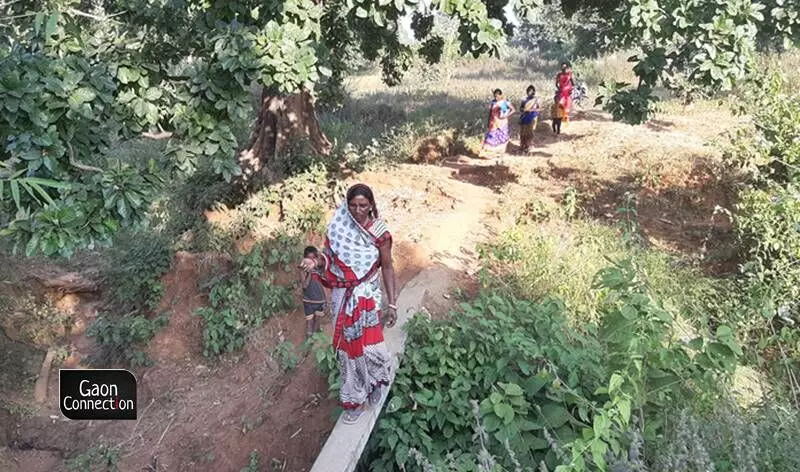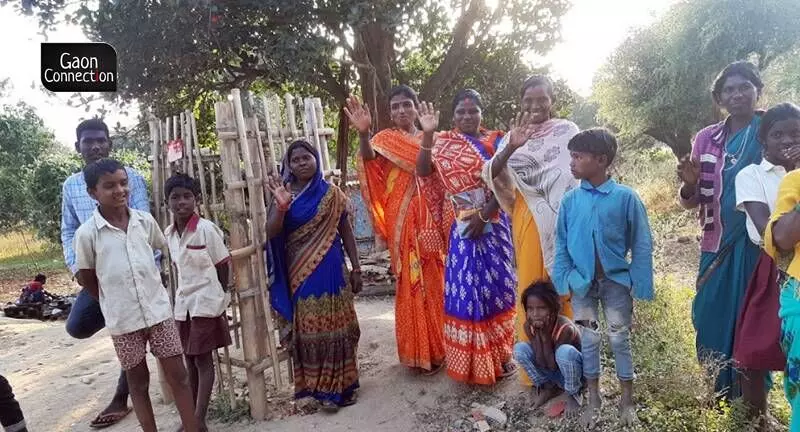Lohardaga, Jharkhand
Every six months, Puja Devi was forced to leave her village behind and move along with her husband, Bijendra Bhuiyan, and their three children in search of a livelihood.
More often than not, the family migrated nearly 375 kilometres away from their village in Jharkhand to Varanasi in the neighbouring state of Uttar Pradesh in search of a job.
“We left home and went as far as Benaras [Varanasi] where we worked at a bhatta (brick kiln),” Puja Devi, who is from Mahua Toli of Karcha village in Lohardaga district, told Gaon Connection. “I earned Rs 150 to make 1,000 bricks. It was back-breaking work. For months we had to live in a temporary shelter,” she added.
But not any more. Puja Devi now rears pigs, and grows tomatoes and chilli on 10 dismil of land (100 dismils = 1 acre) in her village. The sale of vegetables and pigs earns her profit every year.
Like Puja Devi, her neighbour Gita Devi has also stopped migrating in search of work. She also cultivates tomato and chilli on her 10-dismil plot, and rears pigs.
“I invested Rs 2,000 in cultivating tomatoes and chilli, and made a profit of Rs 11,000 in just one crop,” Gita Devi, told Gaon Connection. “I also purchased two pigs for Rs 6,000 and spent around Rs 4,000 to feed them. After selling one of the adult pigs and six baby pigs, I made a profit of Rs 10,000, she added.
The lives of women of Mahua Toli in Lohardaga, about 80 kilometres from the state capital Ranchi, has been transformed in the past three years due to the introduction of a programme — End Ultra Poverty (EUP). The programme was introduced by the Bengaluru-based non-profit, The/Nudge Institute, in October 2019.
Also Read: Lohe ki kadhai and tricolour thaali show the way to a nutritious life in Jharkhand
As part of the EUP programme, 17 women in Mahua Toli (which has a total of 20 families) were identified and given a grant up to Rs 22,000 each depending on their needs.
The EUP programme also included training workshops for the women in agriculture practices and animal husbandry. The main aim of this programme was to end ultra-poverty among villagers through livelihood earning opportunities in rural areas.

Many women are now planning to purchase more agricultural plots to grow food.
“Seventeen women of Mahua Toli first got Rs 6,000 each. They were then given the rest of the grant, and also trained in farming and animal husbandry,” Punit Kumar Sahu, community development officer of The/Nudge Institute in Lohardaga, told Gaon Connection.
The EUP programme was supported by the Deendayal Antyodaya Yojana – National Rural Livelihood Mission (DAY-NRLM), and the Jharkhand State Livelihood Promotion Society (JSLPS).
From migrant workers to women farmers
Life of the residents of Mahua Toli was always hard, as they had limited sources of earning and most villagers were neck-deep in debt. It was the moneylender from whom they had loaned money, who would send them to the bhattas to work and he would receive a 10 per cent of their earnings as commission.
Also Read: The Cane Cutters of Gujarat: They work 12 hours a day and get paid after six months
“Whatever we earned at the bhatta, the loan amount and commission were deducted and we were paid the remaining sum,” Puja Devi recalled. “We women returned home to Lohardaga with no more than Rs 15,000 in hand, after six months of back breaking labour. Once that money was exhausted, we were forced to migrate again. Our children were deprived of education,” she recounted.
The vicious cycle continued till the EUP programme was launched in the village.The End Ultra Poverty (EUP) Programme was started in Jharkhand in October 2019 after a survey, based on villagers’ financial status.
John Paul, director of TheNudge Institute, told Gaon Connection that initially, each of the identified families was given a weekly financial support of Rs 300 to Rs 400 (a part of Rs 22,000 grant) for their daily meals. They were then encouraged to participate in livelihood training sessions, and start a kitchen garden in their homes to add nutrition to their diet, he added.

The lives of women of Mahua Toli in Lohardaga, about 80 kilometres from the state capital Ranchi, has been transformed in the past three years due to the introduction of a programme — End Ultra Poverty (EUP).
“We helped those who had plots of land to cultivate something on them, and trained those who did not have land, in animal husbandry,” Paul said.
Slowly, benefits of the programme started to show. “The initiative saw more and more women choosing to stay back and work their fields, rather than migrating,” Sahu of TheNudge Institute said.
Hirawati Devi, one of the women from Mahua Toli, who benefitted from the grant described how it brought about a change in their lifestyles. “Women started saving money with the samooh [self-help groups], and could take loans from them at one per cent interest,” she told Gaon Connection.
Women who don’t own land have the option of leasing it annually for anything between Rs 800 and Rs 1,200 to grow food, Hirawati Devi added.
The change has been welcome, said Mina Devi who made a profit of Rs 15,000 from growing tomatoes on her 10 dismil plot of land. “The fact that we stay in our villages has meant our children can go to school and we can avail of many government schemes such as Antyoday Yojna, Janani Suraksha Yojna, etc,” she said.
Many women are now planning to purchase more agricultural plots to grow food, Mina Devi told Gaon Connection.
Rural women as entrepreneurs
The women of Mahua Toli, where the programme first began three years ago, are reaping the benefits of it in multiple ways, including linkages with self-help groups (SHGs).
The availability of loans from the Pooja Mahila Mandal, and Aarti Mahila Mandal SHGs are encouraging more women to start businesses.
According to Hirawati Devi, the women hesitated to take the loans as they had no means of repaying them. But, once the EUP programme provided them with some means of a livelihood, women were more open to taking loans, Hirwati Devi said. They can take a loan up to Rs 3,000, she added, that they can repay at just one per cent interest.
Women have repaired their homes, purchased more livestock and started small businesses with the loans that are now so easily available to them.
For Sukri Devi who took a loan of Rs 3,000 to start an egg shop, it has been a blessing. She earned a profit of Rs 4,000 from her sales and has also returned the loan amount, she said.

The poverty elimination programme was introduced by the Bengaluru-based non-profit, The/Nudge Institute, in October 2019.
“Borrowing money from the money lender meant interest rates of up to 10 per cent and more. But not any more as we are now able to start our own enterprise and repay the loans at such minimal interest,” Anita Devi, another beneficiary, said happily.
The Ripple Effect
The three year EUP programme has since ended in Mahua Toli in October 2022. But, the/Nudge Institute will continue to be associated with these women to help them access government facilities, such as old age pension, widow pension, etc. that they are entitled to from the rural development department.
The project is currently running in 110 villages across Lohardaga, Latehar and Gumla districts in Jharkhand at a cost of Rs 7.5 crore. When it began there were 400 women who came under the EUP, but now there are 1,200 women in the programme, John Paul said.
The director of The/Nudge Institute told Gaon Connection that following the success of EUP, the state government has also implemented the programme in East Singhbhum, Godda and Palamu districts since July 2022. The programme will spend Rs 15 crore that will benefit 4,000 women.
The/Nudge Institute has also started EUP in Karnataka in July 2022 where 1,200 women will benefit from Rs 7 crore. There are also plans to start a similar programme in Rajasthan that will benefit about 500 women who will be helped with Rs 4 crore, the director of TheNudge Institute added.


















